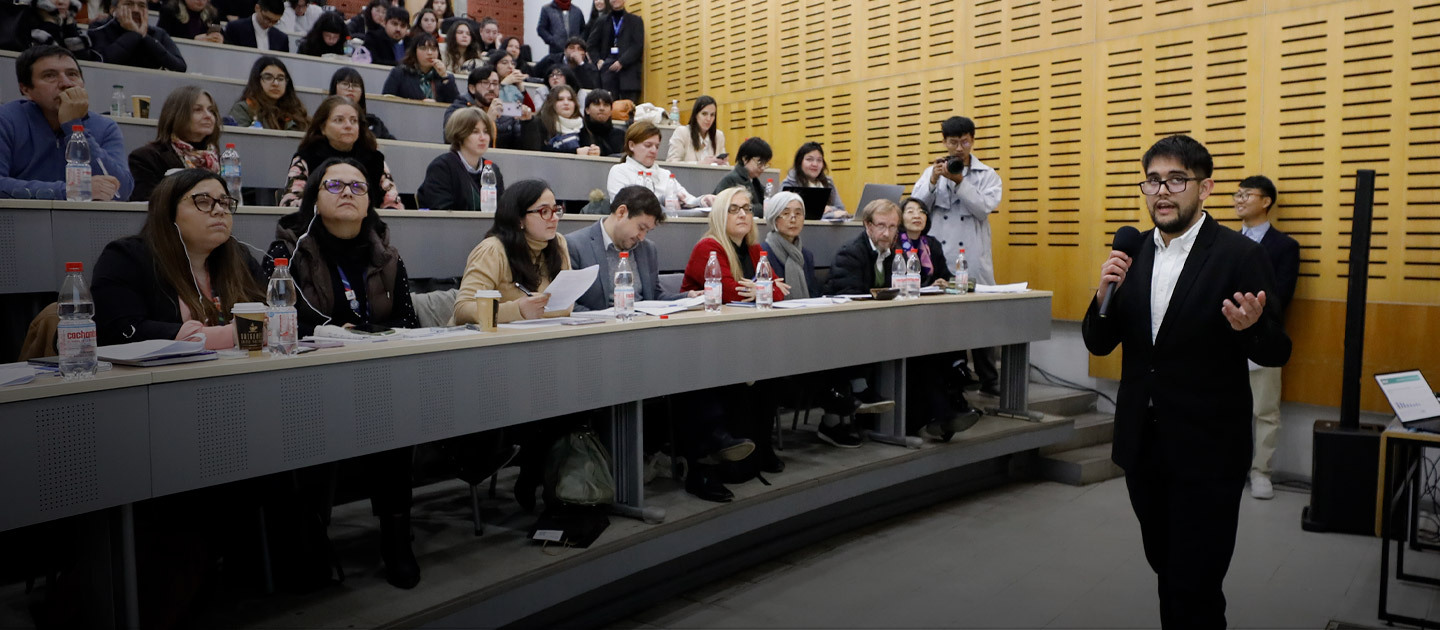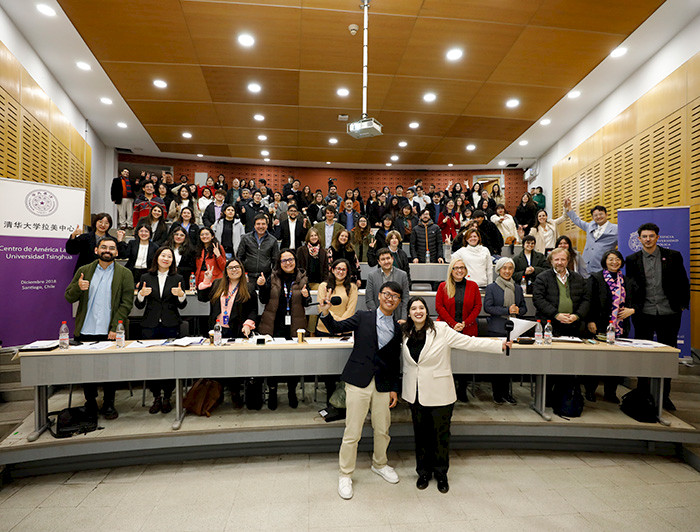
Chinese and Chilean Students Seek Innovative Solutions to Fight Poverty
08 October 2024
The "Youth Challenge to Alleviate Poverty" is a competition hosted by Tsinghua University in China, inviting student teams from Latin America to develop creative solutions for poverty alleviation. The first iteration in Chile took place from May to August, in collaboration with UC Chile.

photo_camera A total of 95 Chilean students from various universities and 80 students from China participated in this inaugural event. The winning team was recognized for their proposal, "EcoVidaQuintero App," aimed at addressing ecological poverty, air pollution, and nutritional contamination in Quintero Bay in the Valparaíso Region of Chile. (Photo credit: César Cortés Dellapien.)
To tackle major global challenges effectively, both an interdisciplinary approach and cultural diversity are essential. This was the core focus of the "Youth Challenge to Alleviate Poverty," organized by the Latin American Center of Tsinghua University in collaboration with Pontificia Universidad Católica de Chile (UC Chile). The event was supported by the Chinese Embassy in Chile and CGE (Compañía General de Electricidad, in Spanish), a Chilean electricity company.
Students were invited to collaborate on innovative, practical solutions to alleviate global poverty. The contest began in May and concluded in August, when winners were announced.
Expanding Global Collaboration and Exchange
95 students from various Chilean universities formed 21 teams to compete, while in China, 80 students took part. Tsinghua University also held the competition in Brazil in collaboration with the Federal University of Rio de Janeiro.
The Vice President for International Affairs, Lilian Ferrer, emphasized, “Young people play a fundamental role in building our future. They’re not just tomorrow’s leaders; they are the change agents of today. This challenge empowered students to be an active part of the solution.”
Chen Tao Tao, Director of Tsinghua University’s Latin American Center, added, “It’s impressive that students are engaging with global challenges and seeking ways to solve them at such a young age.”
Winning Proposals

Over the three-month challenge, students received mentorship from faculty at both UC Chile and Tsinghua University. They also attended lectures, including an online course, "Exploring Latin America and the Caribbean," taught by Professor Francisco Gallego from the Institute of Economics and the Institute for Sustainable Development at UC Chile.
After advancing through various stages, nine teams reached the final round:
- Three Chinese teams
- Five Chilean teams
- One international team (comprised of students of various nationalities studying at Tsinghua University)
All participants presented their proposals in English from August 20-22 to a panel of ten judges, which included academics and private sector professionals, at UC Chile’s San Joaquín Campus in Santiago.
The solutions showcased innovative approaches to poverty from different perspectives. Projects included initiatives for neurodivergent inclusive education, financing strategies for Chile’s fishing and aquaculture sectors, and a program to reduce loneliness among older adults.
The first-place award went to Team 10, a Chilean team, for their project “EcoVidaQuintero App: Ecological Poverty Alleviation for Sustainable Growth in Quintero and Puchuncaví Sacrifice Zone.” This team consisted of students from UC Chile, Universidad de Chile, and Universidad Federico Santa María.
- Gold Award: Team 10 (Chile) – "EcoVidaQuintero App: Ecological Poverty Alleviation for Sustainable Growth in Quintero and Puchuncaví Sacrifice Zone"
- Silver Award: Team 1 (Tsinghua) – "Contribution of Inclusive Finance to Poverty Reduction"
- Bronze Award: Team 6 (Chile) – "Between Seniors: Program to Alleviate Loneliness in Older Adults"
Participants and Perspectives
Diego Urcelay Solís de Ovando, a Sociology student at UC Chile, reflected, “Working with Chinese students and connecting with Ph.D. students from Tsinghua University was incredibly enriching. Despite our differences, we realized we face similar challenges.”
Yu Chen, from Team 1 (second place), shared that the experience of visiting Chile allowed her to “encounter diverse ideas from other students. The friendships we formed were the most valuable part.” Her team presented the project, "Contribution of Inclusive Finance to Poverty Reduction."
Third place went to Team 6 from Chile for their project “Between Seniors: A Program to Alleviate Loneliness in Older Adults.”
The winning Chilean teams received an all-expenses-paid trip to China for an internship at Tsinghua University during the southern hemisphere summer, where they will learn about China’s experiences in poverty alleviation.
Developing Global Competencies

Chen Tao Tao noted, “These presentations were moving. Even if some solutions aren’t perfect, the students' enthusiasm shines through. It’s clear that these young minds are dedicated to working toward a better future.”
For UC Chile’s Office of the Vice President for International Affairs, this challenge aligned with key strategic objectives: cultural exchange, learning from global experiences, and improving English proficiency.
Vice President Lilian Ferrer remarked, “We encourage our students to engage in experiences that cultivate global skills and competencies, contributing to personal growth and preparing them to make a positive impact in an interconnected world.”
Institutional Collaboration and Future Outlook
Maribel Florez, Director of Global Learning, valued the partnership with Tsinghua University: “Our shared commitment to global competencies aligns closely with Tsinghua’s approach. Their Global Competency Development Center and our Global Learning Office at UC Chile created a natural synergy for this collaboration.”
Reflecting on future initiatives, Professor Chen Tao Tao emphasized, “We’re fortunate to have UC Chile as a partner. Working together, we’re moving steadily toward a bright future. I look forward to continued collaboration as we tackle shared challenges.”
The jury included notable figures from academia and industry:
- Francisco Gallego, Professor, Institute of Economics, UC Chile
- Liu Jian, Professor, School of Architecture, Tsinghua University
- Flavia Zacconi, Professor, Faculty of Chemistry and Pharmacy, UC Chile
- Fernando Sossdorf, Professor, Institute of International Studies, Universidad de Chile
- Trinidad García, Director of International Relations, Fundación Luksic
- Carolina León, Director of Centralized Services, CGE
- Camila Bravo, Manager, Center of Excellence at CGE
- Du Xia, Researcher, School of Economics and Management, Tsinghua University
- Cristian Díaz, Director of Global Mobility, Office of the Vice President for International Affairs, UC Chile




